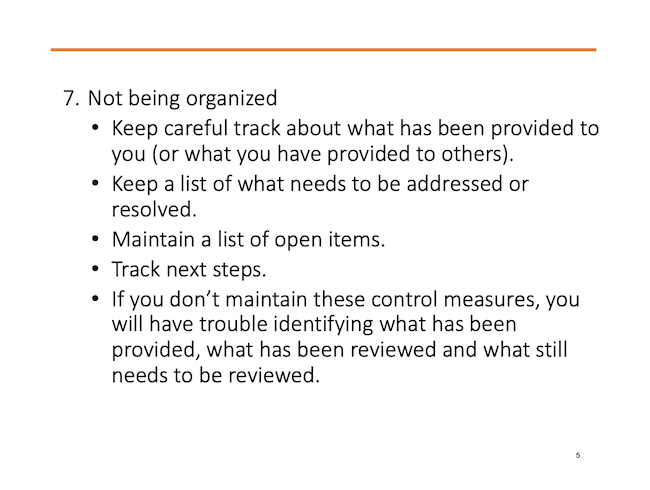- Being Bashful
- There are no dumb questions.
- You may be the only person looking at a document – if you don’t raise the issue, nobody may ever know about it.
- Losing interest
- Diligence can be monotonous.
- It is, however, the key to helping negotiate representations, warranties, indemnities, and other key items in an M&A context.
- Not understanding the client’s business
- If you don’t understand their business, you will have difficulty focusing on the key issues for that client.
- Failing to communicate
- Communicate with your team to ensure all materials are reviewed.
- Communicate with the other side to obtain or clarify information.
- Keep a record of what has been sent to the other side in the event of a dispute.
- Losing your resolve
- Some clients (or their counter-parties) will not welcome you to conduct diligence. It can be a highly intrusive situation for their business. Some are better than others about welcoming (or tolerating) your presence.
- Determine the point person at the Company.
- Be courteous; Understand their availability. Recognize that he/she may have ongoing obligations in addition to responding to you.
- Underwriters want to sell something. Everyone wants to say something – but is IT supportable? Sometimes you’ll have to say no – the statement is not supportable!
- Losing track of the transaction
- Keep track of changes to structure or other changes in the transaction.
- Failure to keep track means you will likely miss critical issues. Since transactions sometimes take several months, it’s important to keep your diligence obligations in mind as the transaction evolves.
- Not being organized
- Keep careful track about what has been provided to you (or what you have provided to others).
- Keep a list of what needs to be addressed or resolved.
- Maintain a list of open items.
- Track next steps.
- If you don’t maintain these control measures, you will have trouble identifying what has been provided, what has been reviewed and what still needs to be reviewed.
Slide titles:

7 Common M&A Due Diligence Mistakes

Being Bashful & Losing interest

Not understanding the client’s business & Failing to communicate

Losing your resolve

Losing track of the transaction

Not being organized







